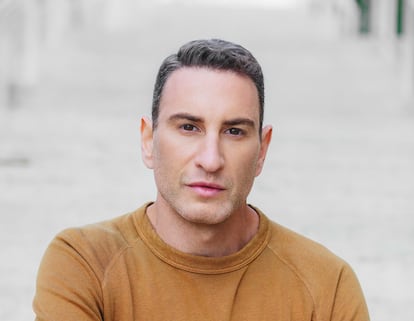Scott Lyons, psychologist: ‘There’s a massive addiction to drama. The whole world is now our stage to get ‘likes’
The author of the book ‘Addicted to Drama’ warns that the attention economy fosters a dramatic language that dominates social media, causing stress and instability

After a tortuous divorce, Scott Lyons, 40, called his ex-husband over and over again. He did it when he was bored or in despair. He also did it when he started feeling better. At first, he thought that maybe he was addicted to his ex. But after analyzing the situation, he realized that the problem was even worse than he thought: he was addicted to drama.
Lyons is a psychologist, educator and host of The Gently Used Human podcast. After his breakup, he had the knowledge and the tools to stand back and take stock of his life. He searched for information in philosophical treatises, scientific studies and books on the subject, but he ended up finding more prejudice than useful insight. For six years, he researched and wrote the manuscript of what would become Addicted to Drama: Healing Dependency on Crisis and Chaos in Yourself and Others (2021).
While he doesn’t like the term “drama queen” due to the stigma attached to it, he does think that social media is creating an epidemic of “drama addicts.” He warns that we all know someone who fits this profile, but practically nobody would admit that drama is their addiction.
Scott Lyons granted an interview to EL PAÍS via video call, to discuss his book, his research and his personal experiences.
Question. You’ve drawn up a profile of the drama addict to define what is popularly known as a “drama queen.” Why have you decided to exclude the latter term from your book?
Answer. It’s derogatory. That’s why I don’t use it. But, at the same time, it’s a very interesting term to analyze. It’s been around for a long time. Everyone knows someone addicted to drama; they’re often referred to as a narcissistic, or an attention-seeker, or, the term you mention, a “drama queen.” But [those labels] eliminate empathy, which could help us understand what’s really happening.
Q. Normally, the term “drama queen” has been used to define women and homosexuals. It seems to have gotten a lot of bad press…
A. Yes, it’s a term that has many biases associated with it. The dramatic refers to a kind of histrionic behavior, which, historically, has been associated more with women, especially since [the time of psychoanalyst Sigmund] Freud. It’s like hysteria — a nervous disease associated with women. I don’t recall any case of a man who has been hospitalized for hysteria.
It’s easy to reduce drama junkies to a stereotype, but their reality is more complex. They’re not trying to get noticed just to get noticed. There’s much more nuance. For them, drama is a survival mechanism.
Q. In your book, you note that you faked a suicide attempt as a teenager.
A. Yeah, I faked my suicide attempt because of what I call “weaponized empathy.” [It was meant] to force some empathy around me. I was bullied by students and teachers — I just wanted it to stop. As a 13-year-old boy, I didn’t have many tools to manage it. I thought that no one was going to listen to me. So, I fabricated a scenario where I believed they would feel the pain that I felt. And now, I see this all the time, with patients having a hard time communicating their needs.
Q. Being addicted to drama is a bit like being a hipster: we’re surrounded by them, yet, nobody admits to being a hipster. Why is that?
A. When we look for drama, we often do so unconsciously; we’ll never see ourselves as the culprits. In the [perceived] reality of the person addicted to drama, all actions and behaviors can be justified, there’s no sense of regulation. Blowing out a birthday candle with a fire hose might sound crazy, but it’s reasonable to someone who can’t gauge how much energy, attention and emotion it takes to do it.
Q. And this addiction is contagious…
A. Yes. It’s called stress contagion. It’s a response from our mirror neurons, which make us empathize with the feelings of someone close to us. Stress is the most contagious [sentiment] that we have — it’s the emotional state that neurons best reflect, even more so than love. We are evolutionarily designed to look for signs of stress in other people, in case we need to react to the same stressor. It’s a matter of survival. If a bear is chasing you, and we meet in a field — your eyes are wide, you’re breathing heavily — I’m going to be alert before you have time to tell me anything about the bear. Stress is an emotion designed to be contagious, so that we don’t need to have a verbal conversation to respond to it. That’s why it’s important to know if you’re around someone who’s addicted to that kind of stress, addicted to conflict, [because] when you’re around them, you’re having a physiological response in your body. You have to [create distance] and take responsibility for your own health and well-being.
“On TV, drama and tension serve as narrative engines. And there, they can be fun, but in real life, they carry a physiological cost.”
Q. In your book, you claim that the attention economy and social media have fostered an epidemic of drama. How so?
A. 20 or 30 years ago, we [were addicted] to drama in a more intimate way. Now, we’re addicted with massive exposure. Capitalism has created an attention economy. This is the most important commodity. Capturing and keeping our attention makes it possible to sell, through ads, anything. And this has a cost. In order to capture and hold the attention of the maximum number of people, some stress has to be induced. In this way, a more emotional, more intensified language is used. Stories that generate sadness, anger, or fear are the most shared. They creep into our lives, so we start recreating them, replicating those scenarios and imitating that language in our social media posts, even though we’re not living through [such dramatic] experiences. And so, we end up becoming part of the stress economy.
Q. In recent years, Instagram has been filled with photos of influencers crying.
A. It’s ridiculous. Yes, very authentic, but how many takes did you need to get that photo crying? How much preparation? How many photos did you discard? It’s a difficult balance because, on the one hand, [influencers] are sending the message that it’s healthy to express feelings and not only show the good stuff on social media, but they’re manufacturing this content. They’re living through the emotionality of their social avatar, as opposed to their authentic self. [All the studies on this subject] suggest that, the more we live as our social avatars, the more disconnected we are from ourselves. This dissonance creates severe depression. We see the highest rates of depression in teenage girls, who turn to social media, abuse filters and chase ‘likes.’
“Politics becomes performative. Our culture is increasingly performative to get attention.”
Q. But the addiction to drama in social media doesn’t only have to do with individual users. Some traditional media outlets also fall into this phenomenon to get clicks…
A. Sure. The news also replicates these mechanisms. There’s an epidemic of drama. The whole world is now our stage to portray this great drama and be rewarded with likes. The problem — as with any addiction — is that our tolerance level grows. And so, we need more drama for something to grab our attention. 20 years ago, the news needed less stimulation to grab someone’s attention. Now, [media companies] need more violence, more intense language, more sex. We need dramatic tools to hold people’s attention.
Q. And how does that affect the public debate?
A. A lot. Politics becomes performative. Our culture is increasingly performative to get attention. And this just escalates. 10 years from now, we’re going to need a lot more stress-inducing stimuli to get someone’s attention. We know that — in the absence of that stimulus — people [suffer from] withdrawal symptoms. And how do you navigate this [withdrawal]? By seeking or creating more drama, because stress and drama work like social glue. It makes us feel closer to each other, which is why we do what is called “drama bonding.”
Q. Drama bonding?
A. It means that we connect with other people by holding onto each other’s drama. It makes us feel part of something. That’s why we like to gossip.
Q. Connecting with friends through gossip doesn’t seem like such a terrible thing. How much drama is too much drama?
A. It’s funny, because when you watch TV shows like RuPaul’s Drag Race, [the judges] are always talking about the need for drama. They ask for more dramatic performances, more dramatic make-up… On TV, drama and tension serve as narrative engines. And there, they can be fun, but in real life, they carry a physiological cost. You have to know how to process and metabolize that drama [and] all the stress that it generates. Any drama can be too much drama if you don’t know how to handle it.
Sign up for our weekly newsletter to get more English-language news coverage from EL PAÍS USA Edition
Tu suscripción se está usando en otro dispositivo
¿Quieres añadir otro usuario a tu suscripción?
Si continúas leyendo en este dispositivo, no se podrá leer en el otro.
FlechaTu suscripción se está usando en otro dispositivo y solo puedes acceder a EL PAÍS desde un dispositivo a la vez.
Si quieres compartir tu cuenta, cambia tu suscripción a la modalidad Premium, así podrás añadir otro usuario. Cada uno accederá con su propia cuenta de email, lo que os permitirá personalizar vuestra experiencia en EL PAÍS.
¿Tienes una suscripción de empresa? Accede aquí para contratar más cuentas.
En el caso de no saber quién está usando tu cuenta, te recomendamos cambiar tu contraseña aquí.
Si decides continuar compartiendo tu cuenta, este mensaje se mostrará en tu dispositivo y en el de la otra persona que está usando tu cuenta de forma indefinida, afectando a tu experiencia de lectura. Puedes consultar aquí los términos y condiciones de la suscripción digital.









































